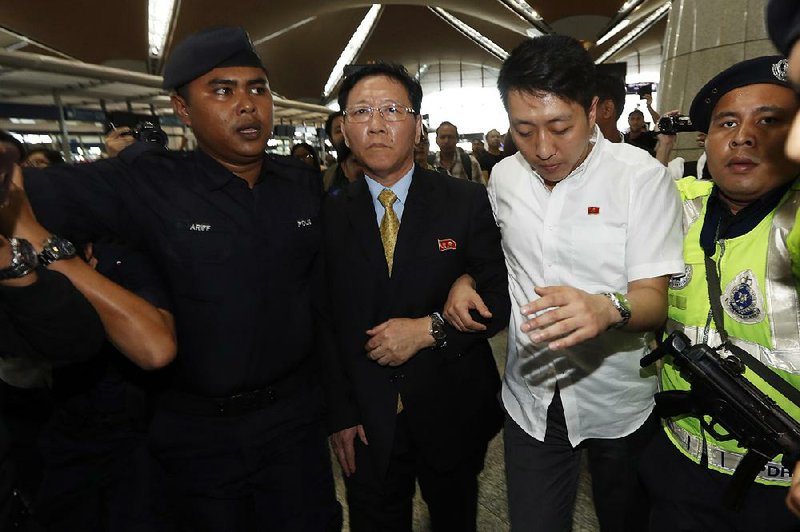KUALA LUMPUR, Malaysia -- Malaysia's prime minister said today that he has instructed police to prevent all North Korean citizens from leaving Malaysia "until we are assured of the safety and security of all Malaysians in North Korea."
The announcement by Prime Minister Najib Razak came after North Korea announced that it had banned Malaysians from leaving that country. The Korean Central News Agency said the ban will be valid until the safety of North Korean citizens in Malaysia is guaranteed.
Najib, saying North Korea is "effectively holding our citizens hostage," expanded a travel ban from Malaysia that officials previously said was limited to North Korean Embassy officials and staff members. Malaysia has said North Korea's ban affects 11 Malaysian citizens currently in North Korea -- three working at the Malaysian Embassy, two United Nations workers and six family members. There are believed to be some 1,000 North Koreans working in Malaysia.
Deputy Prime Minister Ahmad Zahid Hamidi said Malaysia had not wanted to retaliate, but did so because North Korea had "manipulated what we call a murder case."
"When we are confronted with a country that has breached international diplomatic norms and ethics, we have no choice," he said.
Relations between the countries have deteriorated after Kim Jong Nam, the half brother of North Korea's leader, was attacked with a nerve agent at a Kuala Lumpur International Airport terminal Feb. 13. The ensuing diplomatic battle appears to have strained North Korea's ties with one of its few international allies.
Kim died less than 20 minutes after two women wiped the VX nerve agent on his face, authorities say. The women, one from Vietnam and one from Indonesia, have been charged with murder.
North Korea has denied any role in the killing and accused Malaysia of conspiring with Pyongyang's enemies. North Korean Ambassador Kang Chol rejected a Malaysian autopsy that found Kim was killed with VX, a banned chemical weapon.
Kang's criticism of Malaysia prompted the nation on Saturday to declare him "persona non grata" and give him two days to leave. Najib said the decision to expel Kang sent a clear message.
"It means that we are firm in defending our sovereignty and dignity," Najib said. "Don't ever insult our country, and don't try to cause disruptions here."
Kang departed late Monday afternoon from Kuala Lumpur International Airport, where he told reporters that Malaysia was doing "great harm" to the countries' relations.
Soon after, North Korea's news agency said Malaysia's ambassador would also be expelled.
Malaysia's Foreign Ministry spokesman, Raja Nushirwan Zainal Abidin, said North Korea's decision to expel the Malaysian envoy had been expected.
"This reciprocal action is normal in diplomacy," he said, adding that the envoy had been recalled two weeks ago for consultations and was still in Kuala Lumpur.
Malaysia's finding that VX killed Kim boosted speculation that North Korea was behind the attack. Experts say the oily poison was almost certainly produced in a sophisticated state weapons laboratory, and North Korea is widely believed to possess large quantities of chemical weapons, including VX.
North Korea is trying to retrieve Kim's body but has not acknowledged that the victim is Kim Jong Un's half brother, as Malaysian government officials have confirmed.
Ri Tong Il, a former North Korean deputy ambassador to the United Nations, has said Kim Jong Nam probably died of a heart attack because he suffered from heart disease, diabetes and high blood pressure.
Health Minister Subramaniam Sathasivam said pathologists have ruled that out.
Still, a lawyer for the Vietnamese suspect said news of existing health problems should be cause for a new autopsy. He also claimed that Malaysian pathologists do not have expertise in VX.
"I am writing to the attorney general tomorrow for a second postmortem," attorney Selvam Shanmugam, who represents Doan Thi Huong, said Monday.
"They should have a foreign forensic [team] to participate in the postmortem," he said.
On Monday, the fallout from the diplomatic battle also reached the sports field.
Citing security concerns, Malaysia won't allow its national soccer team to travel to North Korea for a qualifying match for the 2019 Asian Cup, the Football Association of Malaysia said. Malaysia was due to play North Korea on March 28.
The association has asked the Asian Football Confederation to shift the venue from Pyongyang to a neutral arena.
Information for this article was contributed by Tran Van Minh, Hyung-Jin Kim and staff members of The Associated Press.
A Section on 03/07/2017
